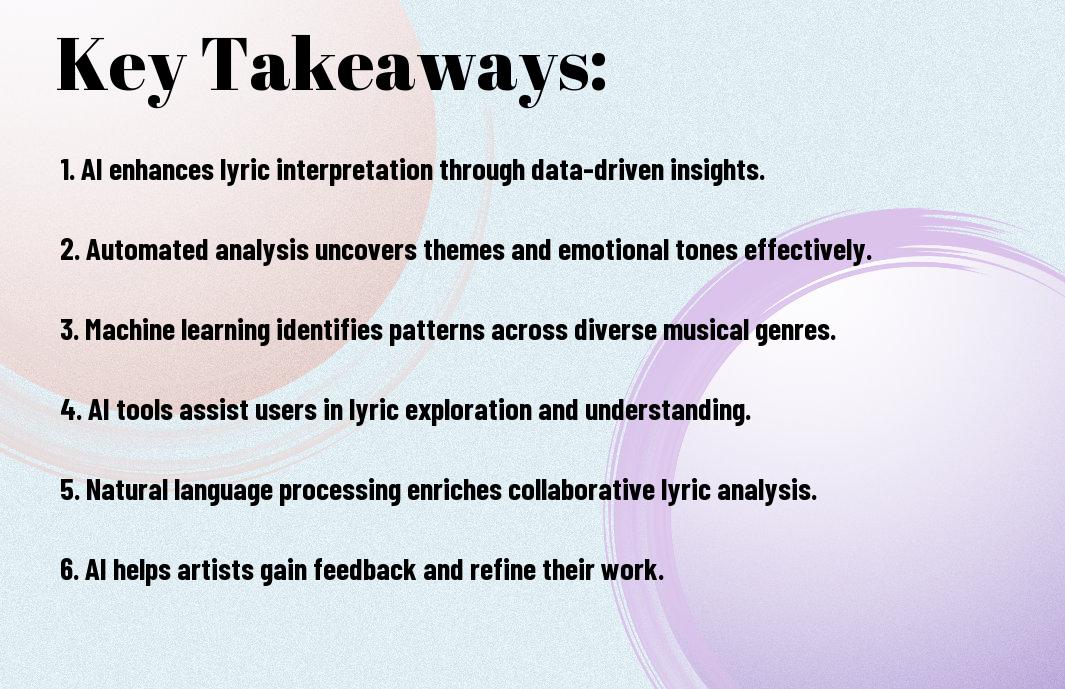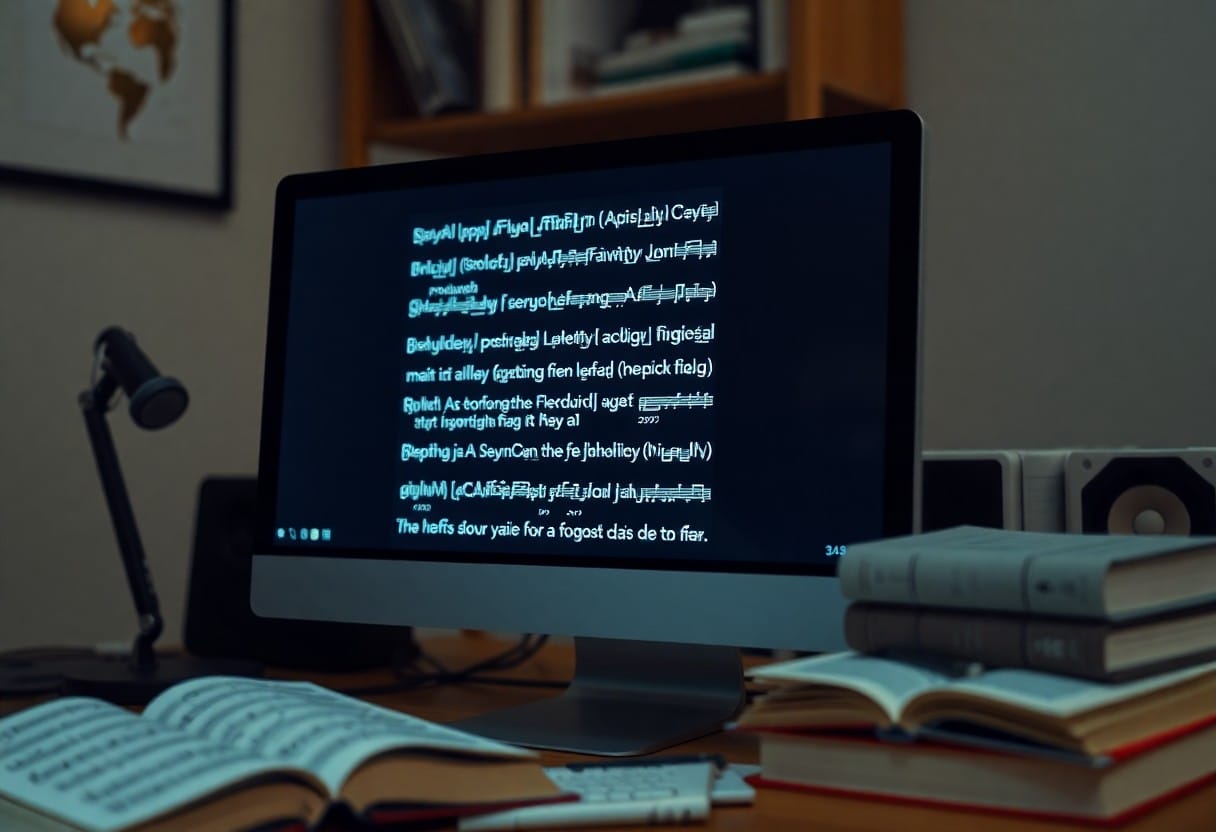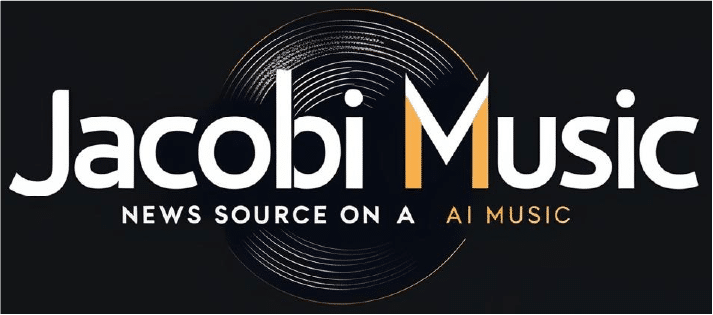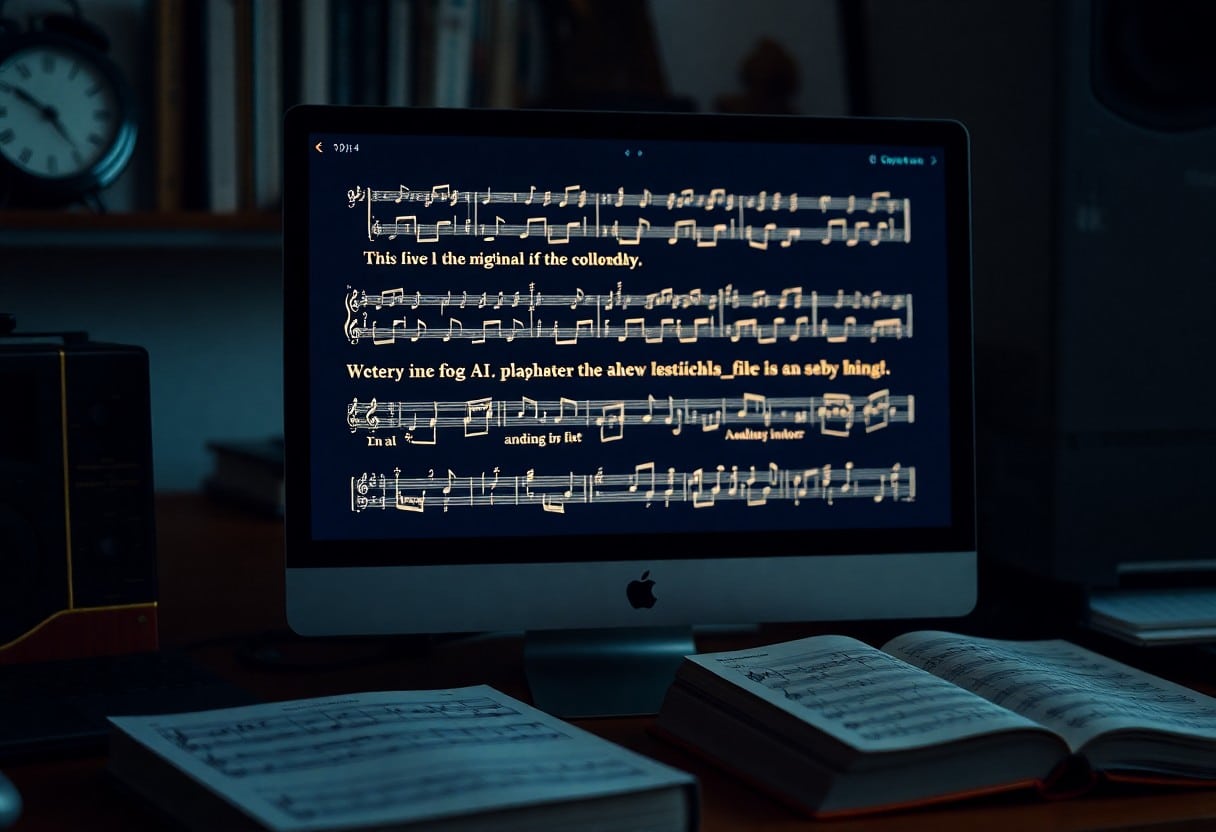Over the past few years, I have observed remarkable advancements in artificial intelligence, particularly in how it interacts with music and lyrics on platforms like Genius. In this post, I will investigate into the innovative ways AI tools analyze song lyrics, offering you insights into their meanings, themes, and cultural impact. By the end, you’ll have a clearer understanding of how AI can enrich your exploration of music and provide deeper connections to the songs you love.
The Role of AI in Lyrics Analysis
To understand the transformative impact of AI on lyrics analysis, I find it fascinating how these technologies can process vast amounts of data, identifying patterns and meanings that we might overlook. By leveraging algorithms, AI enables deeper insights into the emotional and thematic elements within song lyrics, allowing both fans and creators to appreciate the art form on a whole new level.
Overview of AI Technologies
After exploring lyrics analysis, I’ve come to appreciate how various AI technologies, including neural networks and deep learning, are instrumental in processing linguistic data. These advanced systems can sift through extensive lyric databases, applying analytical techniques that provide a more nuanced understanding of the text’s significance and context.
Machine Learning and Natural Language Processing
At the forefront of AI-driven lyrics analysis are machine learning and natural language processing (NLP). These fields empower algorithms to understand, interpret, and generate human language, enabling machines to decipher the poetic structures, metaphors, and emotions embedded in lyrics.
Language models, which form the backbone of NLP, are trained on vast amounts of text, allowing them to recognize patterns, sentiments, and contextual meanings. By utilizing machine learning, these models continuously improve, enhancing their ability to dissect and analyze lyrical content. They can identify recurring themes and trends, providing music enthusiasts with valuable insights into the evolution of lyrical expression across genres. With AI’s support, we can now engage with lyrics in ways that were previously unimaginable.

Enhancing Lyric Interpretation
Clearly, the integration of AI in analyzing song lyrics offers a transformative approach to enhancing our understanding of meaning and emotion. By leveraging advanced algorithms, I can probe deeper into the nuances of lyrics, revealing layers of interpretation that may not be immediately evident. This technology empowers you to appreciate the artistry behind the words, offering fresh insights that elevate your listening experience.
Sentiment Analysis of Lyrics
Among the most fascinating applications of AI is sentiment analysis, which assesses the emotional tone of lyrics. By evaluating word choice and contextual cues, I can determine whether a song conveys happiness, sadness, anger, or nostalgia, enabling you to connect more profoundly with the artist’s intentions.
Contextual Understanding of Themes
Below the surface of any song lies a tapestry of themes waiting to be unearthed. Through AI-driven contextual understanding, I can explore lyrical themes in relation to historical events, social movements, or personal experiences, enriching your grasp of the narrative. This approach not only highlights recurrent motifs but also connects songs with their cultural significance.
Another intriguing aspect of contextual understanding is the ability to observe how themes evolve over time within an artist’s discography. By analyzing patterns across different albums or eras, I can illustrate how personal experiences, societal changes, or artistic development influence lyrical content. This insight offers you a broader perspective on the artist’s journey and the role of their music within the larger cultural landscape.
AI Tools Used in Genius Lyrics Analysis
Your exploration of AI’s role in Genius lyrics analysis showcases a variety of tools that enhance the understanding of song lyrics. For instance, many discussions on platforms like Reddit investigate into Thoughts on Meaning of Song lyrics interpreted by AI?. These tools help illuminate the layers of meaning embedded in lyrics while also facilitating user engagement through interactive features.
Automated Transcription and Annotation
Below, I will highlight how automated transcription and annotation technologies streamline the process of converting song lyrics into accessible text. These AI-driven tools efficiently scan audio files, transcribe lyrics, and add contextual annotations, creating a richer experience for fans seeking deeper insights into their favorite tracks.
AI-powered Recommendation Systems
After delving into automated transcription, I find AI-powered recommendation systems to be another fascinating aspect of Genius lyrics analysis. These systems provide personalized song suggestions based on your listening history and preferences, allowing you to discover new music that resonates with your tastes.
Understanding how AI-powered recommendation systems function reveals their ability to analyze data patterns and user behavior. By leveraging complex algorithms, these systems assess song attributes, user preferences, and trends within the music industry. This not only enhances your listening experience but also fosters a deeper connection to new artists and genres you might not have explored otherwise.
Case Studies: AI in Action
After exploring the use of AI in music, it’s important to look at specific case studies that highlight its effectiveness. Here are a few noteworthy examples:
- 1. Spotify’s AI-driven playlist curation analyzing over 40 million tracks to create personalized playlists.
- 2. Amper Music’s AI composing original music, generating tracks for content creators in under 5 minutes.
- 3. AIVA (Artificial Intelligence Virtual Artist) composing film scores, recognized for its work in the 2020 Cannes Film Festival.
- 4. Jukedeck’s AI generating over 80,000 unique pieces of music in a year for various clients.
Successful Applications in Music Industry
An increasing number of companies are successfully integrating AI into their music-related projects. For instance, AI algorithms have revolutionized music recommendation systems, enabling platforms like Pandora and Apple Music to suggest songs that align with users’ preferences. This personalized experience has led to increased user engagement and customer satisfaction.
Comparisons with Traditional Analysis Methods
Methods traditional analysis methods focus on subjective interpretation, while AI utilizes large datasets for objective insights. Here is a summary of key differences:
| Aspect | Traditional Methods |
|---|---|
| Data Handling | Manual and limited datasets |
| Speed | Time-consuming analysis |
| Consistency | High variability due to human bias |
| Insights | Qualitative findings |
Indeed, the differences between traditional methods and AI analysis are significant. While traditional approaches often rely on subjective interpretations by musicologists, AI leverages vast datasets to uncover patterns and trends, offering quantitative insights. This ability enables a deeper understanding of musical elements and listener behaviors, ultimately transforming music analysis into a more scientific and data-driven field.
Challenges and Ethical Considerations
Many artists and critics express concern regarding the implications of AI in lyrics analysis. The intersection of technology and creativity raises questions about originality, ownership, and the societal impact of relying on artificial intelligence for insight into music. Issues related to transparency, data privacy, and the potential for bias in AI algorithms demand careful examination as we navigate this evolving landscape.
Limitations of AI in Creativity
At the core of AI’s application in creativity lies the challenge of replicating human emotion and intuition. While AI can analyze patterns and produce lyrical content, it often falls short in understanding the deeper emotional nuances that resonate with audiences. This limitation raises important questions about the authenticity and value of AI-generated creative works.
Addressing Copyright and Attribution Issues
Limitations in AI’s ability to navigate copyright and attribution laws further complicate its integration into creative fields. As I use AI to analyze and interpret lyrics, it is vital to consider how the generated insights may infringe on the rights of original creators, and how to properly attribute the sources influencing the AI’s interpretations.
Considerations around copyright and attribution are increasingly important as the use of AI in music analysis grows. You may find that AI models often learn from a vast array of pre-existing texts, raising concerns over potential copyright infringement if the output resembles the original works too closely. It’s vital to establish clear guidelines and ethical practices to ensure that creators’ rights are respected and that they receive proper acknowledgment for their contributions. By doing so, you help foster a responsible relationship between technology and the creative arts.

Future Prospects of AI in Music Analysis
Once again, the landscape of music analysis is shifting as AI continues to advance. As innovations in machine learning and natural language processing emerge, I foresee AI playing an even more significant role in decoding song lyrics, detecting nuances of emotion, and revealing hidden patterns in musical compositions. This evolution could revolutionize our understanding and appreciation of music in ways we have yet to imagine, making it an exciting time for both artists and listeners alike.
Innovations on the Horizon
Behind the scenes, emerging technologies in AI promise to provide enhanced tools for music analysis. These innovative systems will likely utilize advanced algorithms that can interpret not only lyrical content but also the emotional undertones of melodies and harmonies. The potential for AI to create tailored listening experiences or suggest new genres based on individual preferences is just the beginning of an exciting journey into the future.
Impacts on Artists and Listeners
Across the music landscape, AI is set to reshape how artists create and how listeners engage with music. This transformation holds the power to democratize music-making, allowing artists to harness sophisticated analytical tools to refine their craft. Additionally, listeners may benefit from enhanced song recommendations that resonate deeply with their personal tastes and emotions, fostering a more immersive musical experience.
This shift in the music industry can empower artists by providing insights into audience preferences and trends, allowing them to tailor their work to resonate more effectively. For listeners, the convenience of AI-driven playlists and recommendations can lead to discovering new artists and genres that they may not have encountered otherwise. Ultimately, the collaboration between AI and music promises a richer, more connected experience for everyone involved.
To wrap up
With this in mind, my exploration of AI in Genius lyrics analysis reveals its potential to transform how we engage with music. By leveraging AI, I can uncover deeper meanings, contextualize lyrics, and enhance my appreciation of artistry. As a music lover, I encourage you to embrace these advancements, as they offer valuable insights and enrich your listening experience. Together, we can navigate this evolving landscape and appreciate the artistic depth that technology brings to our musical journey.

